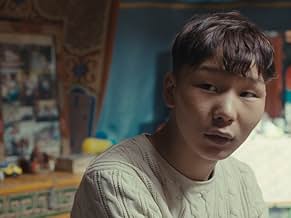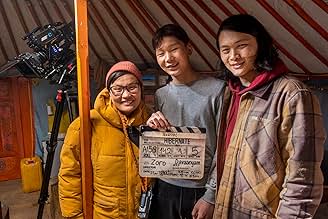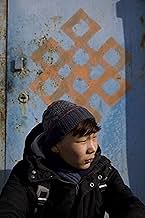NOTE IMDb
7,2/10
899
MA NOTE
Ulzii, un adolescent pauvre mais orgueilleux, est déterminé à gagner un concours de physique pour obtenir une bourse d'études, mais sa mère analphabète trouve un emploi à la campagne et le l... Tout lireUlzii, un adolescent pauvre mais orgueilleux, est déterminé à gagner un concours de physique pour obtenir une bourse d'études, mais sa mère analphabète trouve un emploi à la campagne et le laisse avec ses frères.Ulzii, un adolescent pauvre mais orgueilleux, est déterminé à gagner un concours de physique pour obtenir une bourse d'études, mais sa mère analphabète trouve un emploi à la campagne et le laisse avec ses frères.
- Réalisation
- Scénario
- Casting principal
- Récompenses
- 7 victoires et 8 nominations au total
Avis à la une
I know next to nothing about Mongolia, which was an additional reason why I wanted to see this fantastic film. So thanks to it, I travelled around this country and saw both the new-built capital city as well as the outskirts and the countryside, where the main character, a teenager Ulzii lives with his troubled mother and three younger siblings. I've seen colder winters, but without enough coal and wood there's no way of surviving in the yurt.
From what I understand it is not in the culture to ask for help when in need, so Ulzii is faced with decisions to make, which leads him straight into adulthood.
This heartwarming picture reminds us of so many essential things such as responsibility for the young in the family, the importance of education, caring for the climate both in your yurt and your world, modest living and many others. I left the cinema with a smile on my face and in my heart.
From what I understand it is not in the culture to ask for help when in need, so Ulzii is faced with decisions to make, which leads him straight into adulthood.
This heartwarming picture reminds us of so many essential things such as responsibility for the young in the family, the importance of education, caring for the climate both in your yurt and your world, modest living and many others. I left the cinema with a smile on my face and in my heart.
'If Only I Could Hibernate' is a must-watch for anyone who appreciates cinema that not only entertains but also inspires and moves. It's a beautiful reminder of the power of storytelling and the art of film.
From the very first scene, it captures the viewer's imagination, taking them on a journey that is as heartwarming as it is thought-provoking
The performances in this movie are nothing short of stellar. Each actor brings a level of authenticity and emotional depth to their character, making the story come alive in the most beautiful way. Their ability to convey complex emotions with subtlety and grace adds a layer of richness to the film that is truly captivating.
From the very first scene, it captures the viewer's imagination, taking them on a journey that is as heartwarming as it is thought-provoking
The performances in this movie are nothing short of stellar. Each actor brings a level of authenticity and emotional depth to their character, making the story come alive in the most beautiful way. Their ability to convey complex emotions with subtlety and grace adds a layer of richness to the film that is truly captivating.
In a one-room ger in the Mongolian capital, Ulaanbaatar, lives lanky teenager Ulzii; his widowed, alcoholic mother; and his three siblings. His mother is unable to earn enough to feed all her children and it falls to Ulzii to supplement the family income by doing odd-jobs - unloading a van or delivering meat, for example. But he has a special, intuitive talent for physics, and an inspirational schoolteacher suggests he enter the national physics competition (yes, such things exist - introducing the film at the 2023 London Film Festival, editor Alexandra Strauss explained that although this film is a work of fiction, it is based on a documentary). If Ulzii wins, he will get a scholarship. But with all of his family responsibilities, can he put in the time required for study?
For Western audiences, a film from Mongolia is a rare treat. As well as the central plotline, the film also provides a look at modern Mongolia, where ancient traditions meld with today's way of life: in one scene Ulzii is sent to visit his aunt in her modern, high-rise flat in order to place his big toe in his infant nephew's mouth - this, apparently, is a sure-fire way to cure a facial rash. As the film progresses (writer/director Zoljargal Purevdash cleverly marking the passage of time by every so often changing Ulzii's hairstyle) we see Mongolian teenagers acting like teenagers anywhere: play-fighting, playing sports, lusting after a pair of stylish trainers.
The adventures of a physics student does not sound like a promising subject for a film and it is interesting to speculate whether this film would have worked if it were set in the UK or US; I suspect not. But set in a country that rarely features in Western entertainment, it works a treat.
For Western audiences, a film from Mongolia is a rare treat. As well as the central plotline, the film also provides a look at modern Mongolia, where ancient traditions meld with today's way of life: in one scene Ulzii is sent to visit his aunt in her modern, high-rise flat in order to place his big toe in his infant nephew's mouth - this, apparently, is a sure-fire way to cure a facial rash. As the film progresses (writer/director Zoljargal Purevdash cleverly marking the passage of time by every so often changing Ulzii's hairstyle) we see Mongolian teenagers acting like teenagers anywhere: play-fighting, playing sports, lusting after a pair of stylish trainers.
The adventures of a physics student does not sound like a promising subject for a film and it is interesting to speculate whether this film would have worked if it were set in the UK or US; I suspect not. But set in a country that rarely features in Western entertainment, it works a treat.
In a city well lit and dotted with numerous hilltop communication masts, we meet the young "Ulzii" (Battsooj Uurtsaikh) who is living quite a contrasting existence with his mother and three siblings in a yurt than has an one-ring electric cooker and a coal burning stove. He is a gifted physics student whose teacher (Batzorig Sukhbaatar) is trying to coax him to enter a competition and focus more on his studies, but it's increasingly clear that this young man is very much the breadwinner. His recently widowed mother reverts to the bottle when things get tough and yearns to return to the rural, herding, life she had lived before marriage. Their's is a tempestuous relationship, and when things come to an head she takes their youngest away, whilst he and the elder children remain to keep up with their schooling. What follows now sees young "Ulzii" forced to make tough choices as he must reconcile the needs of his family with the time and effort he needs to put into his studies. A lack of coal, wood and a infection in his brother that he can't afford to medicate force him to take a path that addresses the immediacy of their needs but what of his future? I thought Uurtsaikh did well here, juggling the aspirations of a young boy who wanted to be just that, with his responsibilities as a de facto father. The actors portraying the siblings work well too, creating a sense of a family unit - they all share the same small bed - that does care for each other and all want to help. The conditions are bleak. Somehow the harsh cold always looks worse amidst an urban landscape where we are offered enough of a pretty stark comparison between even the most modest of city dwellings and his family's semi-rural existence on the outskirts. It is intense at times, but it is also quite funny too. Who knew the cure for a mouth ulcer involved a saddle-bit and a big toe? It is his younger brother who comes up with the idea of hibernating, and if I'd been there I think I would have agreed.
Really very good. Poignant socio-economic portrait of city life in modern Mongolia, more particularly of poor people who wish to get by by acquiring a good education, among other things. The harsh and cruel side often associated with extreme poverty, hard to receive, is relevant, effective and striking. We also see all the resilience, mutual aid and generosity that human beings can demonstrate. The point presented can be transposed almost anywhere in the world, even in so-called rich countries. Excellent soundtrack to support the story. The recurring musical theme is very beautiful and moving. However, at the beginning of the film, there is an error in the translation of a mathematical term, in the subtitles, surely coming from the fact that the translation was done from Mongolian to English, then to French (confusion between ''integrals'' and ''integers'' which gives ''integers'' in the translation rather than the correct term ''integrals''). A relatively open ending, as is customary in films from the Orient. This work presents us with beautiful life lessons. Good duration.
Le saviez-vous
- AnecdotesOfficial submission of Mongolia for the 'Best International Feature Film' category of the 97th Academy Awards in 2025.
- ConnexionsReferenced in Radio Dolin: Oscars 2024: The Best Films from around the World (2023)
Meilleurs choix
Connectez-vous pour évaluer et suivre la liste de favoris afin de recevoir des recommandations personnalisées
- How long is If Only I Could Hibernate?Alimenté par Alexa
Détails
- Date de sortie
- Pays d’origine
- Site officiel
- Langue
- Aussi connu sous le nom de
- If Only I Could Hibernate
- Lieux de tournage
- Ulan Bator, Mongolie(setting of the action)
- Sociétés de production
- Voir plus de crédits d'entreprise sur IMDbPro
Box-office
- Montant brut mondial
- 358 502 $US
- Durée1 heure 39 minutes
- Couleur
- Rapport de forme
- 2.35 : 1
Contribuer à cette page
Suggérer une modification ou ajouter du contenu manquant
















